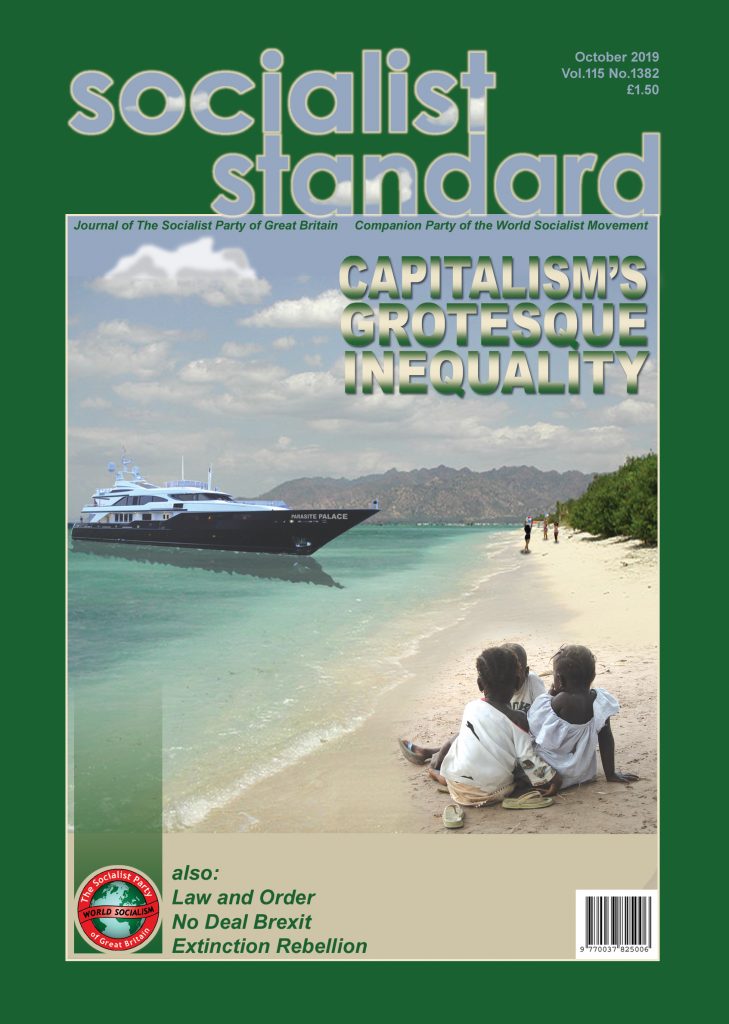Socialists
are a minority in all countries at present. We see the establishment
of socialism being brought about by a majority of men and women who
understand and want it, and who realise that no-one else will bring
it about for them. In short, they will be prepared to work for this
end. We do not have “faith” in the sense that socialism is
something we accept without thinking about it, nor do we encourage
this approach from members of the working class. Quite the contrary:
it is because we think about it and debate that we are socialists.
When the majority of workers also examine the material conditions in
the world and how they operate, socialism will be introduced. The
majority of the working class, including those who vote for the
Labour Party, do not understand or want socialism at present.
Socialism
means that there will be unrestricted free access by all to whatever
is produced, because the means of production will be owned by all.
Socialism does mean equality and freedom. It is the only condition on
which they can be obtained. The spread of Socialist knowledge has
been hindered by the widespread mis-use of the term 'socialism'. When
it is used to describe everything from state-capitalism to Labour
Government it is hardly surprising that workers have only attempted
to solve their problems through reforms. For with the exception of a
small minority they are unaware that there is an alternative to
capitalism. We have every confidence in the ability of the working
class to understand the simple and sound proposition that is
socialism. It is after all the working class which runs capitalism.
If
it would be wrong to say that poverty is an old friend of the working
class, it is certainly a companion from the womb onward. Nowhere in
the world are there any wealthy people starving. But even in the
wealthiest countries there are poor people who go hungry. Poverty is
an inherent part of class society. Under capitalism, the means of
wealth production are concentrated into the hands of a minority
class, or their state machine (which comes to the same thing).
Wealth, the goods and services of society, is produced for sale with
a view to profit. The vast majority are employees. By definition,
they are propertyless. They must sell their working abilities for
wages in order to live. They spend their lives as appendages to the
factories, offices, mines and machinery owned by those who employ
them. They are hired and fired at the dictate of the world market and
the profit margin. They are alienated from life in any meaningful
sense of the word. The wealth they are able to obtain, either through
wages (if employed) or so-called Social Security (if unemployed or
sick) is generally enough to keep them in working order and maintain
themselves and families between pay-days.
Poverty
leaves a terrible imprint upon all who suffer it. Not only in the
physical struggle to get by, but even worse are its mutilating
effects on the personality and the mind. There is nothing so brutally
pathetic, as a worker with a job who counts his “prosperity” in
terms of hard work and rails against other workers who live on social
security, without working. Poverty of the mind can be seen in the
acceptance by most workers of the perverse ideology of their
capitalist masters. It is this which anchors them to capitalism so
that the whole ridiculous set-up keeps going.
It is not uncommon to hear workers in this country argue that if places like India, and other starving areas in the world, were brought up to the standard of living in Western Europe “we” would have to make sacrifices. This reflects the capitalist ideology, in that it glibly looks to solutions within capitalism. Whilst it is true that poverty is a relative thing and that the degree of poverty among workers in most of western Europe is not so extreme as that of many people in India, this becomes a convenient argument in favour of workers here being content with their lot.
We
are often asked why we do not supply details of economic and social
organisation in Socialism. From time to time articles have indicated
lines on which affairs might be conducted. We can say there will be
no money; everyone will have free access to everything produced; the
problems of capitalism — crises, wars, inequality and poverty and
their consequences — will be entirely absent. There are two
important reasons why we cannot go further. The first is that we do
not know. There are a few hundred of us now, and we are working for a
society which will be wholly democratic; how then can we anticipate
the ideas and preferences of millions in the future? Many of us have
our own speculations, but (and this is the second reason) to try
making a policy of them would do no-one any good.
Most
scientists, like other workers, are socially and politically ignorant
about the state of society. Some are religious, spiritualists,
reformers, etc., but they are trained thinkers and should recognise
the existence of social science which is fundamental to a true
understanding of the scientific method. Darwin was able to solve the
problem of how there originated vegetable and animal species in the
struggle for existence. Marx succeeded in solving the problem of how
there arise different types of social organisation in the struggle of
men for their existence. The spirit of research was the same in both
thinkers despite the different fields. The capitalist has enjoyed the
fruits of Darwinism; let us move quickly to the application of the
science of Marx. The introduction of scientific Socialism will mean
the freedom of all science to develop and fulfil its true social
function — as a practical tool for society’s benefit
Our
impatience is with those fellow workers who profess sympathy with our
case but will not join us because they think others are not capable
of doing the same. The point is do YOU understand the meaning of
socialism and are YOU prepared to work with us in the Socialist Party
in order to accelerate the spread of this understanding.























